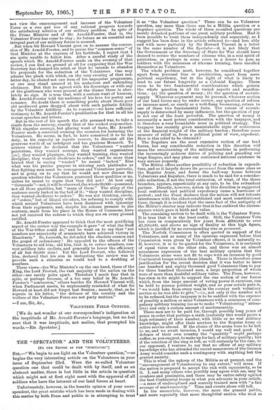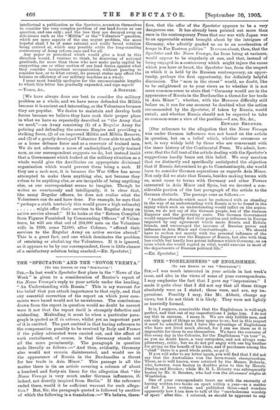Sin,—" We begin to see light on the Volunteer question,"—so
begins the very interesting article on the Volunteers in your issue. of September 23rd. Were the so-called Volunteer 'question one that could be dealt with by itself, and as an abstract matter, there is but little in the article in question which might not at first sight meet with the approval of all soldiers who have the interest of our land forces at heart.
Unfortunately, however, in the humble opinion of your corre- spondent, the great, mistake which has been made in dealing with this matter by both Press and public is in attempting to treat it as "the Volunteer question." There can be no Volunteer question, any more than there can be a Militia question or a Regulars question. The whole of these so-called questions are merely detached portions of one great military problem. Had it been possible to treat them independently and separately, as I suggest has been done in the article referred to—and less ably and with more partiality by Sir Howard Vincent in a letter in the same number of the Spectator—it is not likely that the Government or the Secretary of State for War should have desired to reduce the numbers of citizens who, in a real spirit of patriotism, or perhaps in some cases in a desire to pose as soldiers with the minimum of irksome training, have enrolled themselves as Volunteers.
The whole problem must, however, be considered together apart from personal bias or predilection, apart from mere political expediency, but in the light of what is likely to tend to our future longevity as a Colonial Empire. There seem to be two fundamental considerations which govern the whole question in all its varied aspects and ramifica- tions : (a) the question of money ; (6) the question of recruit- supply Whatever argument may be pursued, whatever section of our land forces may be under review, any question of reform or increase must, as surely as a well-flung boomerang, return to one of these two fundamental facts. The extent of recruit- supply is determined by many influences, but the question of pay is not one of the least powerful. The question of money is necessarily a most potent consideration with the taxpayer, and is therefore a very formidable lever in political strategy. The taxpayer has recently given unmistakable signs of restiveness at the financial weight of the military burden ; therefore some measure of relief is, from a political point of view, expedient. How is this relief to be obtained ?
The Regulars are the most expensive section of our land forces, but any considerable reduction in this direction will mean the overstraining of the military machine in performing the increasingly arduous duties of policing and guarding our huge Empire, and may place our continued national existence in very serious jeopardy.
The Militia offers another possibility of reduction in expendi- ture, and as it largely draws its personnel from the same class as the Regular Army, and forms the half-way house between Volunteers and Regulars, there is much to be said for a consider- able reduction, if not the total extinction, of what, of the three branches, appears, superficially at any rate, to be the redundant partner. Directly, however, action in this direction is suggested local sentiment and political expediency cause a hurricane of protest ; and the Press declares that the nation will not tolerate interference with the oldest-established and most constitutional force, though it is evident that the mere fact of the antiquity of the Militia's charter may indicate that it has outlived the circum- stances which gave it birth and value.
The remaining section to be dealt with is the Volunteer Force. It is true that it is the least costly. Still, the Volunteer Vote has risen in comparatively few years from £600,000 to over £1,200,000, and shows no sign of finality at this high figure, which is justified by no corresponding rise in personnel.
The Norfolk Commission is often quoted in support of tho Volunteers, and as many of the opinions expressed before that Commission were given by Volunteer officers, it is naturally so. If, however, it is to be quoted for the Volunteers, it is certainly of equal value on the other side, and there was an almost unanimous expression of the best military opinion that the Volunteers alone were not fit to cope with an invasion by good Continental troops within these islands. There is therefore some justification for the recent decision that it was better to have one hundred and eighty thousand good Volunteers than to pay for three hundred thousand men, a large proportion of whom were of more than doubtful military value. The Press, however, has risen in its might to support the one section of our forces which, from the largo amount of voting power it exercises, can be held to possess political weight, and as your article puts it, " we would take from every man in the country such voluntary service as he was able to give,"—i.e., not only is the number not to be reduced, but the taxpayer is to be saddled with the expense of possibly a million or more Volunteers with a minimum of com- pulsory military training (so as to make " Volunteering " attrac- tive) and only a certain amount of marksmanship. These men are to be paid for, through possibly long years of peace. in order that perhaps a sixth (certainly this would prove a high estimate) of their number, with little or no real military knowledge, might offer their services to the Regular Army on active service abroad. If the choice of the arena were to be left to us, and we await invasion, I would say well and good. lu defence of their own country the " quantity " might perhaps suffice, as you suggest, to make up for lack of military quality; but if the selection of the ring is left, as will certainly be the case, to our opponent, I venture to say that no officer of any military knowledge who has attended the recent manoeuvres of the German Army would consider such a contingency with anything but the gravest anxiety.
This is what the upkeep of the Militia as at present, and the "encouragement of Volunteering to any extent," will mean. If the nation is prepared to accept the risk with equanimity, so be it. I, and many others who possibly may agree with me, may be croakers and pessimists, and there may be entire safety against the best Continental troops in what you advocate in your article, —a mass of undisciplined and scarcely trained men with "a fair average of marksmanship." Time and events alone will tell.
In the meanwhile, however, the more the general public, and more especially that more thoughtful section who read so intellectual a publication as the spectator, accustom themselves to consider the very complex problem of our land forces as one question, and one only; and the less they are decoyed away on side-issues such as the " Militia" or the " Volunteer" question, which are mere aspects of the one urgent problem, the more hopeful shall I be of some rational and really broad solution being arrived at, which may possibly settle the long-standing controversy of Army reform once and for all.
Any paper or periodical which would give a lead in this direction would, I venture to think, be deserving of national gratitude, far more than those who now make party capital by supporting one or other section of our land forces against what they consider inexpedient reorganisation, without pausing to consider how, or to what extent, its present status may affect the balance or efficiency of our military machine as a whole.
I must most humbly apologise for the unconscionable lengths to which this letter has gradually expanded, and sign myself
—Yours, &c., A SOLDIER.
[We have always done our best to consider the military problem as a whole, and we have never defended the Militia because it is ancient and interesting, or the Volunteers because they are popular. We desire to maintain and develop both forces because we believe they have each their proper place in what we have so repeatedly described as " the Army that we need,"—an Army consisting (1) of a Regular Army for
policing and defending the oversea Empire and providing a striking force, (2) of an improved Militia and Militia Reserve, and (3) of a greatly developed Volunteer Force able to act both as a home defence force and as a reservoir of trained men. We do not advocate a mass of undisciplined, partly trained men, as our correspondent suggests we do, but instead insist that a Government which looked at the military situation as a whole would give the Auxiliaries an appropriate divisional organisation which would prevent them being a mob. If they are a mob now, it is because the War Office has never attempted to make them anything else, not because they refuse to be anything else, or are incapable of being anything else, as our correspondent seems to imagine. Though be writes so courteously and intelligently, it is clear that, like many Regular officers, he does not realise what the Volunteers can do and have done. For example, he says that "perhaps a sixth (certainly this would prove a high estimate) might offer their services to the Regular Army on active service abroad." If he looks at the " Return Compiled from Figures Furnished by Commanding Officers" of Volun- teers, he will see that out of 204,000 men on the Volunteer rolls in 1899, some 72,000, after Colenso, " offered their services to the Regular Army on active service abroad." This is a great fact., and one which dominates the problem of retaining or abolishing the Volunteers. If it is ignored, as it appears to be by our correspondent, there is little chance of a satisfactory solution being reached.—ED. Spectator.]











































 Previous page
Previous page